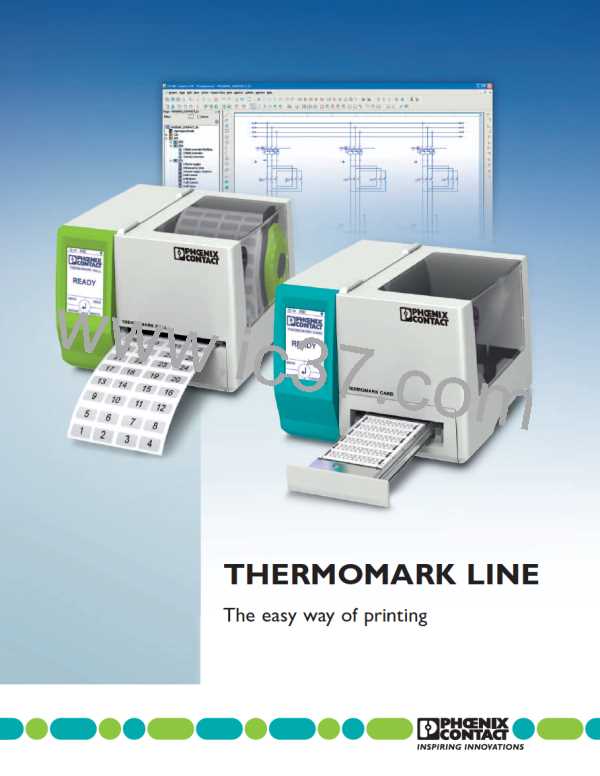Test passed
Test procedure for marking
material in accordance with
recognized standards
� Vibration test
� Grid test
� Finat test method
Mechanical-
test
� Resistance to abrasion
� Scratch resistance
� Abrasion and wipe resistance
� Resistance to solvents
� Kesternich test
� Salt spray
� Resistance to oil and chemicals
� Aging test
Environmental-
tests
� UV light resistance
� Halogen-free protection against flames
� Inflammability classification
Material-
tests
� Material properties
Material properties
Polyamide (PA)
Even at high operating temperatures,
polyamide has excellent electrical,
Contact, absorbs little moisture, is silicone- They are characterized by good chemical
and halogen-free and is suitable for use in
temperatures between -40°C and +125°C.
resistance. Silicone-free, temperature range:
-55°C to +125°C.
mechanical, chemical and thermal
Polyvinyl chloride (PVC)
Polyethylene (PE)
properties. Brief peak temperatures of
up to 200°C are permissible as a result
of heat aging stabilization. Polyamide
absorbs moisture from its surroundings,
on average 2.8%. However, this moisture
is not crystallization water in the plastic
itself, but chemically bonded H2O groups
in the molecular structure. This makes the
plastic flexible and resistant to breakage,
even at temperatures as low as -60°C. PA
belongs to inflammability class V2 to V0
as per UL 94. Polyamide, used by Phoenix
Contact, is silicone- and halogen-free and
is suitable for use in temperatures between
-60°C and +125°C.
PVC has a long service life. It is
Polyethylene is a thermoplastic material
which is highly resistant to acids, alkalis
and other solvents. PE absorbs hardly any
moisture and has a high durability and
breaking elongation. Silicone- and halogen-
characterized by its high mechanical
strength and chemical resistance. Neither
oxygen nor ozone affects PVC. The
material is resistant to corrosive salt
solutions and most acids. Polyvinyl chloride, free, temperature range: -40°C to +80°C.
used by Phoenix Contact, is silicone-free
Halogen-free
and is suitable for use in temperatures
The term halogen-free, based on
between -30°C and +80°C.
international standards for the basic
Polyester
materials for PCBs (e.g. IEC 61249-2-21,
IPC 4101 C), relates to the elements
chlorine and bromine in flame protection
agents. This also forbids the use of flame
protection agents containing halogen in
accordance with DIN EN ISO 1043-4. This
means that, according to the definition in
the ZVEI position paper (requirements for
the use of halogen-free products in the
electrical and electronics industry), no flame
protection agents containing halogen or PVC
are present in the components.
Polyester is a chemical-resistant material.
It is ideally suited to printing, shaping
and punching. Polyester is resistant to
UV radiation and absorbs little moisture.
Polyester, used by Phoenix Contact, is
silicone- and halogen-free. Depending on
its composition, it is suitable for use in
temperatures between -40°C and +150°C.
Polycarbonate (PC)
Polycarbonate has a high mechanical
strength and chemical resistance.
Rigidity, dimensional stability and good
heat distortion resistance are further
distinguishing features of this material.
Polycarbonate is used to manufacture
particularly smooth and stable marking
materials. Polycarbonate, used by Phoenix
Polyolefins
Polyolefins are semi-crystalline
thermoplastics, which can be easily
processed as extrusion profiles (shrink
sleeves).
PHOENIX CONTACT 11

 PHOENIX [ PHOENIX CONTACT ]
PHOENIX [ PHOENIX CONTACT ]